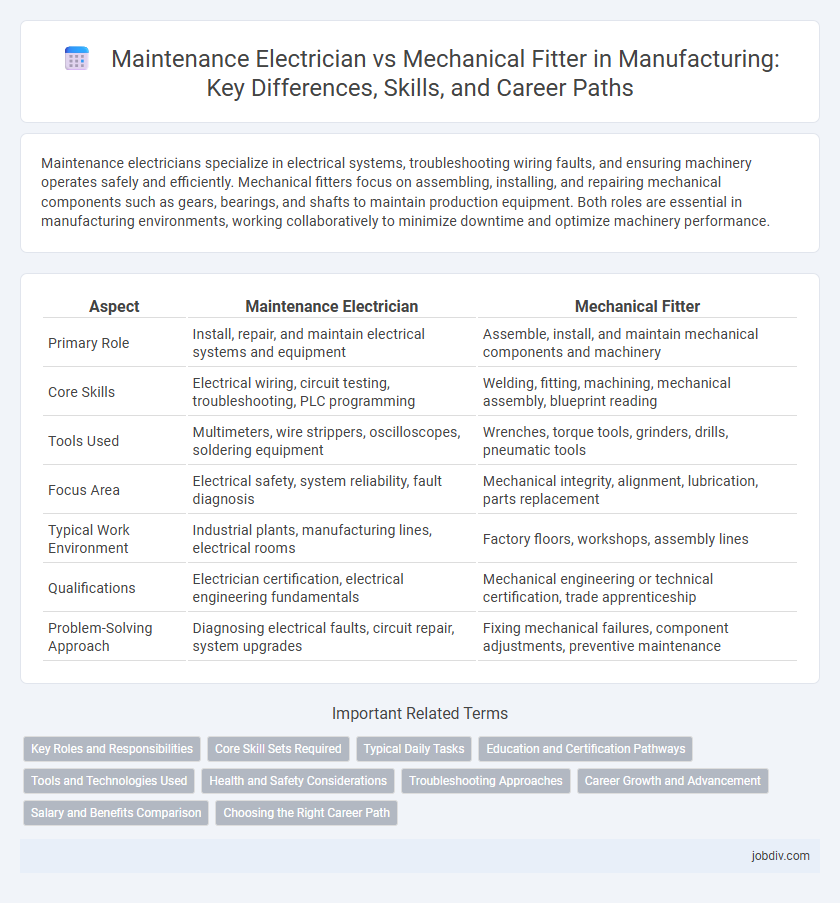Maintenance electricians specialize in electrical systems, troubleshooting wiring faults, and ensuring machinery operates safely and efficiently. Mechanical fitters focus on assembling, installing, and repairing mechanical components such as gears, bearings, and shafts to maintain production equipment. Both roles are essential in manufacturing environments, working collaboratively to minimize downtime and optimize machinery performance.
Table of Comparison
| Aspect | Maintenance Electrician | Mechanical Fitter |
|---|---|---|
| Primary Role | Install, repair, and maintain electrical systems and equipment | Assemble, install, and maintain mechanical components and machinery |
| Core Skills | Electrical wiring, circuit testing, troubleshooting, PLC programming | Welding, fitting, machining, mechanical assembly, blueprint reading |
| Tools Used | Multimeters, wire strippers, oscilloscopes, soldering equipment | Wrenches, torque tools, grinders, drills, pneumatic tools |
| Focus Area | Electrical safety, system reliability, fault diagnosis | Mechanical integrity, alignment, lubrication, parts replacement |
| Typical Work Environment | Industrial plants, manufacturing lines, electrical rooms | Factory floors, workshops, assembly lines |
| Qualifications | Electrician certification, electrical engineering fundamentals | Mechanical engineering or technical certification, trade apprenticeship |
| Problem-Solving Approach | Diagnosing electrical faults, circuit repair, system upgrades | Fixing mechanical failures, component adjustments, preventive maintenance |
Key Roles and Responsibilities
Maintenance Electricians specialize in diagnosing, repairing, and maintaining electrical systems, ensuring machinery operates safely and efficiently. Mechanical Fitters focus on assembling, fitting, and maintaining mechanical components, such as gears, shafts, and bearings, to keep production lines running smoothly. Both roles require technical expertise in troubleshooting and preventive maintenance but differ in their core focus on electrical versus mechanical systems.
Core Skill Sets Required
Maintenance electricians require expertise in electrical systems, including wiring, circuit analysis, and troubleshooting to ensure machinery operates efficiently. Mechanical fitters specialize in assembling, installing, and maintaining mechanical components such as gears, shafts, and bearings, with skills in precision measurement and mechanical repairs. Both roles demand strong problem-solving abilities and adherence to safety standards to minimize downtime and maintain production quality in manufacturing environments.
Typical Daily Tasks
Maintenance Electricians primarily handle the inspection, troubleshooting, and repair of electrical systems, ensuring optimal machine performance and safety compliance. Mechanical Fitters focus on assembling, installing, and maintaining mechanical components like conveyor systems, bearings, and hydraulic equipment to minimize operational downtime. Both roles require routine preventative maintenance to support continuous manufacturing processes and reduce unexpected breakdowns.
Education and Certification Pathways
Maintenance electricians typically require specialized training in electrical systems, often obtained through technical diplomas or apprenticeships, coupled with certifications like OSHA or NFPA 70E for electrical safety compliance. Mechanical fitters focus on mechanical systems and assemble, install, or maintain machinery, often acquiring qualifications through mechanical engineering technology programs or trade certifications such as the NVQ or ASE credentials. Both roles emphasize hands-on experience but differ in their educational pathways, with electricians concentrating on electrical theory and safety standards while fitters prioritize mechanical engineering principles and precision fitting techniques.
Tools and Technologies Used
Maintenance electricians utilize specialized tools such as multimeters, insulation testers, and programmable logic controllers (PLCs) to diagnose and repair electrical circuits and systems. Mechanical fitters rely on precision instruments like micrometers, calipers, and hydraulic presses for assembling and maintaining machinery components. Both roles increasingly incorporate digital technologies, including computerized maintenance management systems (CMMS) and augmented reality (AR) applications, to enhance accuracy and efficiency in troubleshooting and repairs.
Health and Safety Considerations
Maintenance electricians and mechanical fitters both operate in environments with significant health and safety risks, requiring strict adherence to safety protocols to prevent accidents. Maintenance electricians must be vigilant about electrical hazards such as shocks, arc flashes, and proper lockout-tagout procedures to ensure safe handling of live equipment. Mechanical fitters focus on mitigating risks related to heavy machinery, moving parts, and confined spaces, emphasizing proper use of personal protective equipment and ergonomic practices to avoid injuries.
Troubleshooting Approaches
Maintenance electricians use electrical schematics and diagnostic tools to identify faults in wiring, circuits, and control systems, focusing on resolving electrical and electronic issues efficiently. Mechanical fitters employ manual inspection, precision measurement tools, and mechanical knowledge to troubleshoot and repair mechanical components such as gears, bearings, and hydraulic systems. Both roles require systematic problem-solving skills, but electricians focus on electrical fault diagnosis while mechanical fitters address mechanical wear and misalignment.
Career Growth and Advancement
Maintenance Electricians specialize in electrical systems within manufacturing plants, gaining expertise in troubleshooting and repairing complex electrical machinery, which opens pathways to senior electrician roles or electrical engineering positions. Mechanical Fitters focus on assembling, installing, and maintaining mechanical equipment, progressing toward advanced roles such as maintenance supervisors or mechanical engineers. Both careers offer strong growth potential, but electricians often have faster advancement due to increasing automation and reliance on electrical systems in manufacturing.
Salary and Benefits Comparison
Maintenance electricians in manufacturing typically earn salaries ranging from $50,000 to $75,000 annually, reflecting their specialized skills in electrical systems troubleshooting and repair, while mechanical fitters usually make between $45,000 and $70,000, depending on expertise in machinery assembly and maintenance. Benefits for both roles often include health insurance, retirement plans, paid leave, and opportunities for overtime pay, but electricians may receive higher premiums due to the higher risk and technical demands involved. Salary growth potential is generally stronger for maintenance electricians, driven by increasing automation and electrical system complexity in modern manufacturing environments.
Choosing the Right Career Path
Maintenance electricians specialize in electrical systems repair, troubleshooting, and installation, making them ideal for careers in industrial automation and power distribution. Mechanical fitters focus on assembling, maintaining, and repairing mechanical machinery, suitable for roles in manufacturing plants and heavy equipment industries. Selecting between these careers depends on your interest in electrical technology versus mechanical systems and the specific demands of the manufacturing sector you aim to work in.
Maintenance Electrician vs Mechanical Fitter Infographic

 jobdiv.com
jobdiv.com